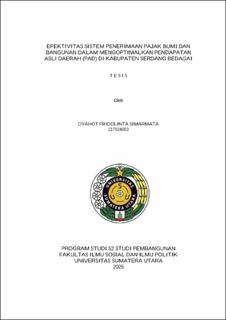Efektivitas Sistem Penerimaan Pajak Bumi dan Bangunan dalam Mengoptimalkan Pendapatan Asli Daerah (PAd) di Kabupaten Serdang Bedagai
The Effectiveness of the Land and Building Tax Revenue System in Optimising Regional Original Income in Serdang Bedagai Regency

Date
2025Author
Simarmata, Dyahot Fridolinta
Advisor(s)
Subhilhar
Thamrin, Muhammad Husni
Metadata
Show full item recordAbstract
The Financial Capacity of Regions, Particularly Local Own-Source Revenue
(PAD), as a Key Challenge in Development and Public Services. Local taxes and
levies, such as Land and Building Tax (PBB), are key components of PAD.
However, PAD realization in Serdang Bedagai Regency remains fluctuating, with
PBB contributions dominated by toll road taxes. This inconsistency in PBB
realization stems from late tax payments, an insufficient number of tax officers
relative to the region's vast area, and a non-integrated manual system. This study
aims to analyze the effectiveness of the Land and Building Tax (PBB) collection
system as a primary component of PAD in Serdang Bedagai Regency. Using a
qualitative descriptive method, data was collected through observation, document
studies, and in-depth interviews with purposively selected informants, including
Bapenda (Regional Revenue Agency) staff, taxpayers, and related stakeholders.
The findings indicate that PBB contributes 30-40% of PAD, with an average annual
revenue growth of 12% post-pandemic. This increase is driven by updates to
taxpayer data, digital payment systems, adjustments to the Tax Object Sales Value
(NJOP), and inter-institutional collaboration. Digital transformation, such as
online payment applications and Geographic Information System (GIS)
integration, has improved PBB collection efficiency and accuracy. However,
challenges persist, including uneven taxpayer awareness, limited technological
access in remote areas, and dynamic property data changes. Employee motivation
factors have contributed to a 20% productivity increase and 98% employee
attendance. Taxpayer compliance is influenced by digital payment convenience,
incentives, and transparency in tax fund allocation, though public resistance
remains. The study recommends strengthening the tax database, improving human
resource capacity, expanding digital infrastructure, and adopting inclusive
approaches for remote communities to ensure PBB becomes a stable and equitable
PAD source. Policy implications emphasize balancing digital transformation with
a human-centric approach to create an effective, fair, and sustainable regional tax
system
